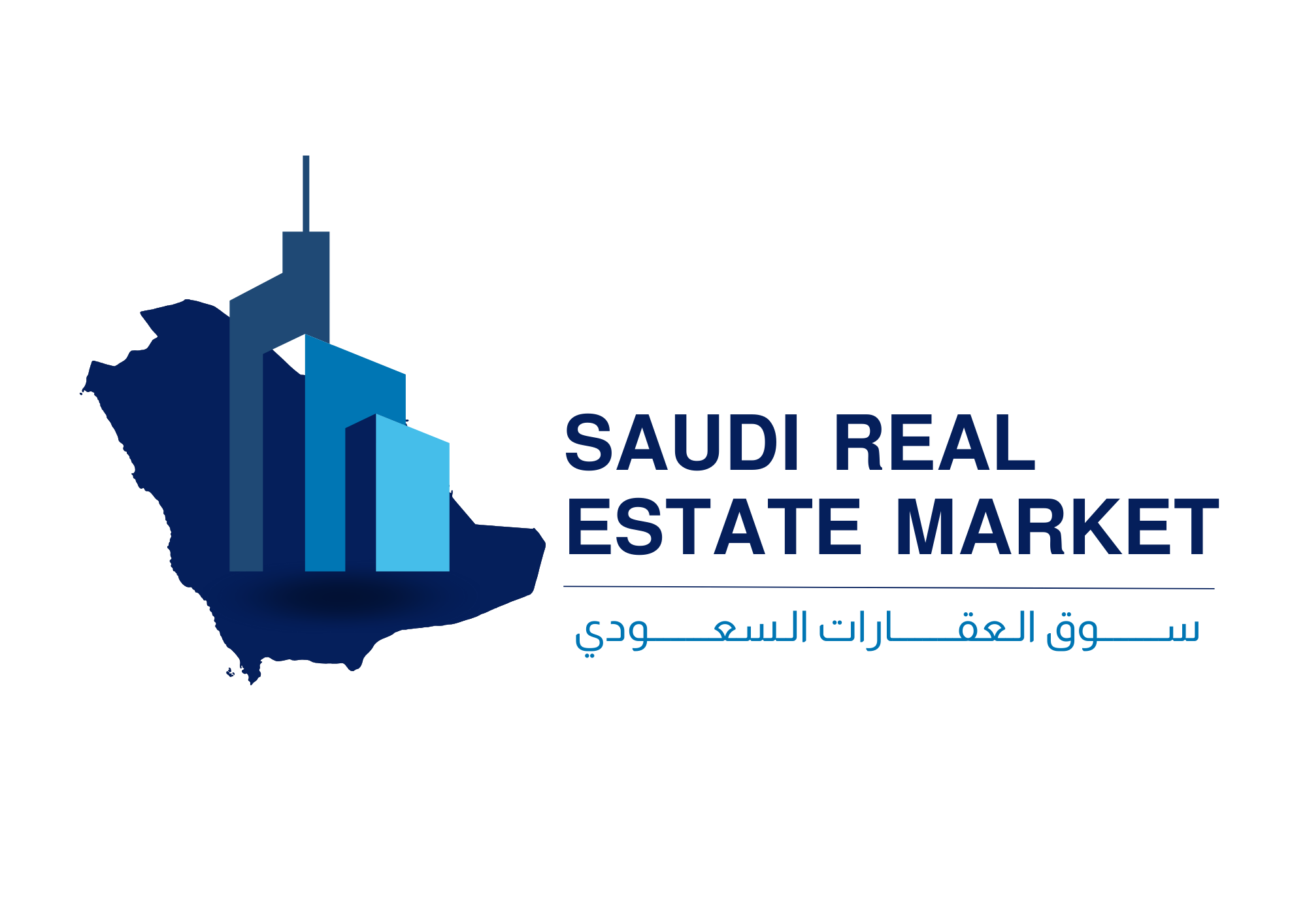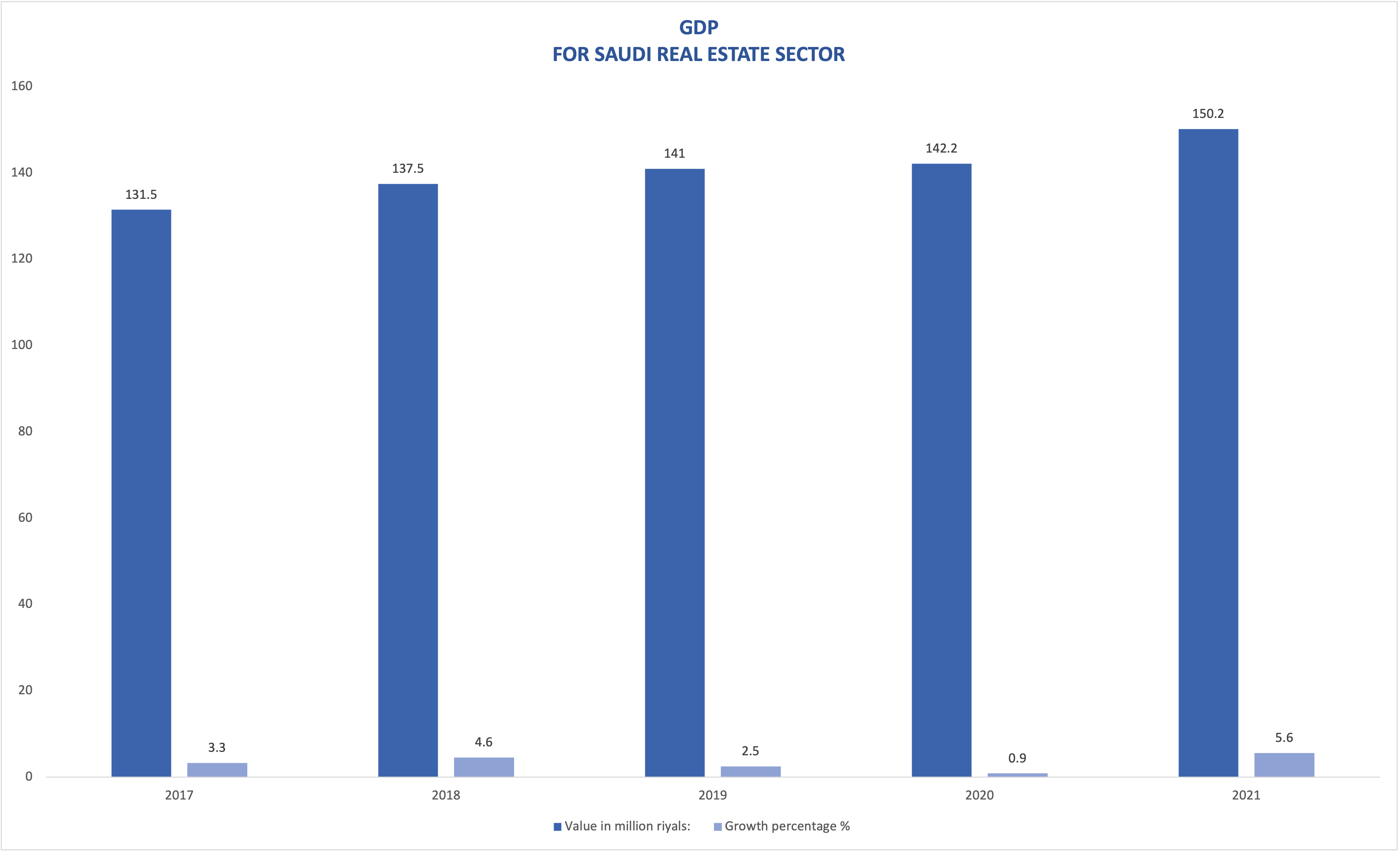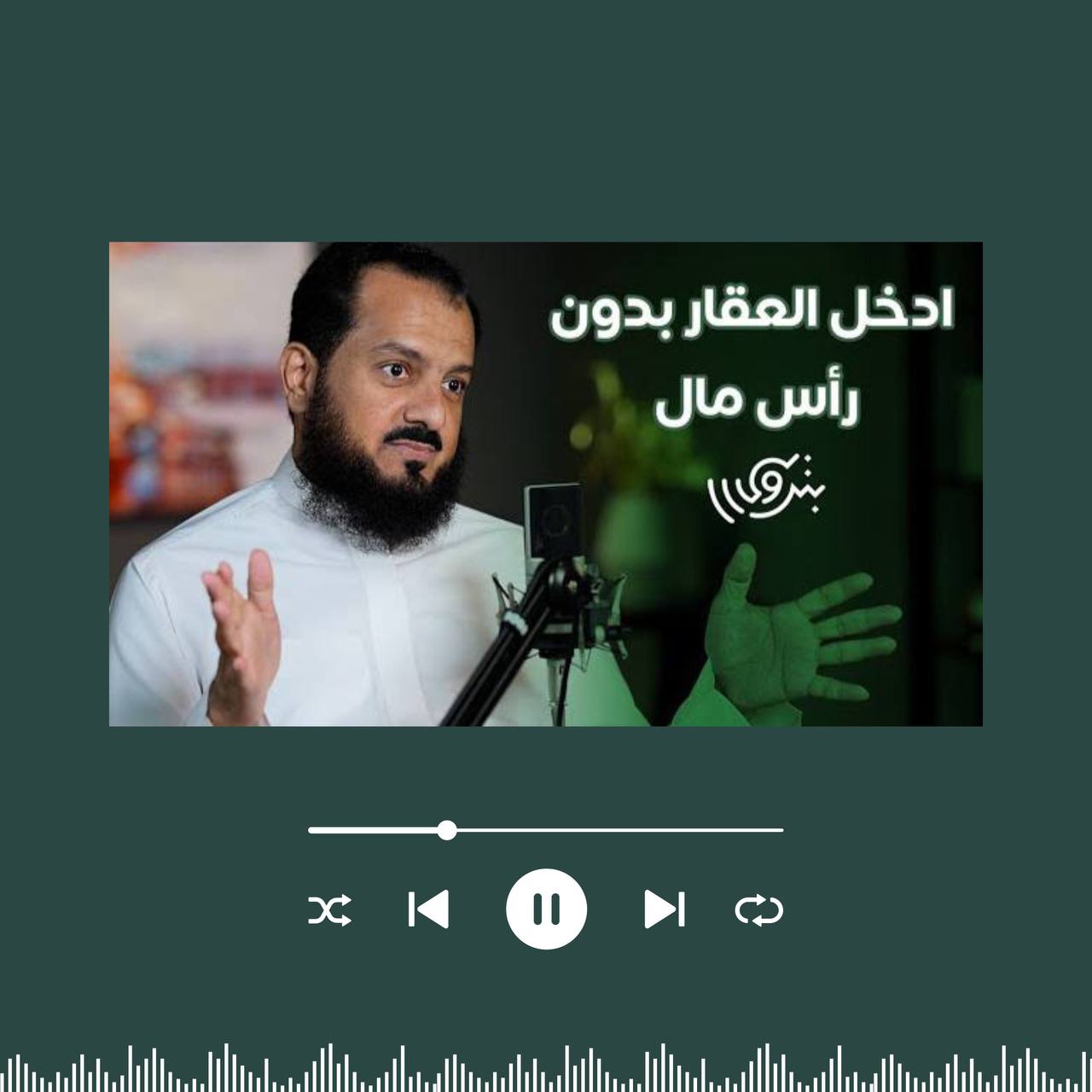Saudi Real Estate Market

The role of the real estate sector in the Saudi economy
The real estate sector in the Kingdom represents an important part of the national economy, and the strength of this sector has been strengthened by the significant work on diversifying sources of income, including the tourism sector and logistics services, in addition to supporting the transportation sector, attracting foreign investments and large infrastructure projects, and the significant improvement in economic activity. Especially after the economy recovered - thank God - from the Covid-19 crisis in addition to the improvement in energy prices during the current period, and the great development in the financial sector, which has become greatly supportive of the real estate sector.
The impact of the real estate sector on the Kingdom’s economy
The Kingdom of Saudi Arabia is one of the most attractive countries for investments due to its oil wealth in addition to its human wealth of ambitious young people to complete the path of the Kingdom’s Vision 2030.
The real estate sector in the Kingdom is one of the most prominent sectors that has witnessed great interest from the Saudi government.
The sector enjoys strong support represented by a package of administrative and investment facilities to attract investments at the local and international levels.
The Saudi market also provides a variety of investment opportunities in the real estate sector, for example, the availability of residential units such as villas and apartments, and commercial units such as shops in commercial centers and areas, in addition to providing suitable lands for establishing companies and factories.
The real estate sector occupies second place among the sectors that contribute most to the gross domestic product, as it contributes to the growth of more than 120 economic sectors in the Kingdom.
The construction sector achieved a growth of 14% compared to 2021, while the real estate activities sector witnessed a jump in growth rates of 60% during the same period.

There is a wide range of types of properties in the real estate sector and they have contributed to the prosperity of the sector in the Kingdom:
- Residential real estate
- Commercial real estate
- Industrial real estate
- Agricultural real estate
- Development projects
Regulating the real estate market:
In light of the rapid growth witnessed in the real estate sector, aligning with Vision 2030 of the Kingdom, official institutions work on regulating this sector and the commercial market in general under official documented frameworks. These frameworks enable those working within it and facilitate their transactions according to clear and encouraging standards to promote the real estate sector in the Kingdom.
The General Authority of Real Estate:
The primary regulator of non-governmental real estate activities in the Kingdom of Saudi Arabia formulates regulatory policies, establishes and monitors indicators, increases awareness of the systems, issues licenses, enhances the capabilities of professionals and creates an electronic database portal for real estate information.
The Authority's vision:
Is to have a vibrant, attractive, trustworthy, and innovative Saudi real estate sector. It has designed its organizational structure to ensure alignment with strategic priorities during interim phases and to possess the necessary capabilities to effectively fulfil its assigned tasks.
Since 2018, the Authority has launched 45 initiatives to regulate the real estate sector, increase confidence, enhance efficiency, improve attractiveness, ensure sustainability, build capabilities, and elevate services. These initiatives include:
- upgrading regulations for real estate registration, brokerage, contributions, ownership, sorting, and management systems.
- formulating a comprehensive strategy for the Kingdom's real estate sector with the participation of 54 relevant entities.
The functions of the General Real Estate Authority encompass:
- Overseeing real estate sector activities to ensure compliance with laws and regulations.
- Developing a framework that facilitates real estate activities and promotes investment.
- Enhancing transparency within the real estate market.
- Promoting innovation in the sector.
- Regulating real estate activities through modern practices and technology.
- Supporting sustainability and economic development in the real estate sector.
The Authority has effectively executed various initiatives as part of its strategy to enhance transparency and improve the real estate sector's environment. These initiatives encompass the launch of a real estate indicators platform for thirteen regions in Saudi Arabia, covering indicators for five major cities and their neighborhoods. They also involve enhancements to the customer experience in the sector and the development of the Authority's partners' portal. Notable platforms and centers also deserve mention:
•Saudi Center for Real Estate Arbitration :
The Saudi Center for Real Estate Arbitration works to alleviate the burden on the courts by resolving disputes arising from programs overseen by the General Authority of Real Estate. The center aims to find quick solutions that satisfy the parties involved in arbitration by adopting an electronic system that facilitates various arbitration procedures and maintains an archive of the issued judgments.
•Mulak (Real Estate Owners):
Mulak platform enables both property owners and occupants of jointly-owned real estate units to organize property management services and facilities through the establishment of a Mulak Association. It does this through a system for real estate unit ownership, sorting, and management, contributing to preserving rights, improving utilization, and promoting a culture of communal living.
• Property Platform:
The Property Platform serves as a committee to address errors in property registration. It receives electronic objections regarding real estate property registration and processes them. It also proposes the controls and standards for addressing property registration issues and for handling property ownership from government authorities, forwarding them to the relevant entities.
•Saudi Real Estate Institute:
The Saudi Real Estate Institute is an educational institution specialized in the field of real estate. It provides training and qualification for professionals in the real estate sector in the Kingdom of Saudi Arabia. The institute aims to achieve the goals of Vision 2030 and is considered the first specialized educational institution in the field of real estate sciences in the Kingdom, in cooperation with local and international partners with expertise in the field of real estate. The institute offers a range of training courses and grants professional certificates to its graduates.
• Ijar (Rental):
Ijar is an integrated electronic network aimed at regulating the real estate rental sector in the Kingdom of Saudi Arabia and preserving the rights of the parties involved in the rental process (the tenant, the landlord, and the real estate broker). It offers a range of electronic solutions that contribute to the development and regulation of the real estate rental sector, thereby increasing trust in its transactions and encouraging investment.
Real estate services
Include a variety of important services in the real estate sector aimed at meeting the needs of individuals and companies regarding real estate. It aims to facilitate buying, selling and leasing processes, provide the necessary information and manage properties effectively and professionally. These services are provided by the Ministry of Justice, the General Real Estate Authority, and other bodies specialized in regulating the real estate sector.
Real estate services include many types of services, the most prominent of which are:
- Real estate marketing.
- Property management.
- Facilities management.
- Real estate auctions.
- Real estate ads.
- Real estate consultations and analyses.
The most important jobs in the real estate sector and their vital role in achieving success
It contributes to increasing the efficiency of national cadres in the real estate sector, and these jobs include a variety of professions and roles that work together to ensure the smoothness and success of real estate deals.
The most prominent of these jobs are:
- Real estate broker: a professional who acts as a go-between for buyers and sellers or tenants and property owners. The broker assists in real estate transactions by offering guidance and support throughout the negotiation process, as well as preparing contracts. The ultimate goal of a real estate broker is to represent their clients' interests and ensure the successful completion of deals.
- Real estate marketer: someone who is responsible for advertising and promoting real estate to the intended audience. They utilize various marketing techniques and tools to raise awareness of the property and draw in prospective buyers. The role of a real estate marketer involves creating marketing materials, such as photos and detailed property descriptions, and handling ad campaigns, including the use of social media and websites.
- Property manager: responsible for overseeing real estate on behalf of the owner or organization, serving as the liaison between the landlord and tenants or other property users.
- Real estate analyst or appraiser: an expert who uses professional standards and methodologies to determine the value of real estate. They rely on their experience and knowledge in the field of real estate and hold an accreditation certificate from a recognized body in the field of real estate evaluation.
The role is not limited to the aforementioned functions only, but all real estate functions work together to enhance real estate sector activity and facilitate real estate transactions. These jobs are essential for achieving clients’ goals and ensuring successful and satisfactory real estate operations for all, and this comes within the comprehensive strategy for the real estate sector, as this sector plays an effective role in increasing its contribution to the national economy, enhancing its contribution to the domestic product, in addition to increasing job opportunities and investments in establishments.
Developing the future of the real estate sector
The real estate sector in the Kingdom of Saudi Arabia is expected to continue to grow in the future, as an important part of the country’s Vision 2030. The Kingdom’s Vision 2030 focuses on achieving sustainable development and economic diversification, improving the quality of life, increasing innovation in building techniques, sustainable practices and urban planning, and achieving The role of economic alliances and partnerships between the public and private sectors, and developing national leadership in the real estate and contracting sector.
Future goals for developing the real estate sector in the Kingdom of Saudi Arabia:
• Raising the percentage of Saudi citizens owning homes from 47% to 52%
• Improving the quality of life in residential projects and achieving sustainable development.
• Increase innovation in building technologies, sustainable practices and urban planning, develop the sector, raise its efficiency and transparency, and maintain its sustainability.
• Realizing the role of economic alliances and partnerships between the public and private sectors to develop the economy.
• Developing national leadership among employees of the real estate and contracting sector, which will reflect on the development of the sector and raise the level of performance and productivity of the national cadres working in it, and achieve the goals of the Kingdom’s Vision 2030 in this context.
A strategy has been developed for the real estate sector in the Kingdom of Saudi Arabia with the aim of making it more vibrant and attractive, with an emphasis on trust and innovation. This strategy includes multiple pillars, goals, priorities and initiatives, and is closely linked to thegoals of Saudi Arabia’s Vision 2030, which aims to achieve a comprehensive transformation in the real estate sector.
The real estate sector programs in the Kingdom include many initiatives and plans that aim to achieve this vision, and among these programs are:
- The Real Estate Developers Support and Empowerment Program, aims to empower real estate developers in the Kingdom and support them in developing their real estate projects
- The “Tatweer” program of the Real Estate Development Fund and the Real Estate Developer Services Center “Etmam”, helps facilitate procedures for developing real estate projects and improving their quality.
- The Saudi Real Estate Institute, provides many training courses and training programs to qualify professionals in the field of real estate
- The Real Estate Future Forum, aims to enhance cooperation between the public and private sectors in the field of real estate development, and achieve sustainable development in this sector
- Real Estate Development Fund offers developer services that improve the quality of real estate projects. Services include housing support, self-build, and financial participation.
Programs to develop the future of the real estate sector in the Kingdom of Saudi Arabia
It aims to achieve sustainable development in various sectors and diversify the country’s economy. These programs include:
• Training future leaders: The Human Resources Development Fund “Hadaf” and the General Real Estate Authority are holding a training program to develop future leaders from employees of the real estate and contracting sectors.
• Partnership between the public and private sectors: The Future of Real Estate Forum emphasizes the role of partnership between the public and private sectors to develop the economy.
• Commercial renaissance and digital transformation: The commercial sector in the Kingdom is witnessing a remarkable renaissance, as demand for workspaces and co-working solutions increases, and innovations in real estate technology are reshaping the market.
• Improving the quality of life in residential projects: The Saudi government seeks to improve the quality of life in residential projects, in an effort to achieve sustainable development.
• Increase innovation in building techniques, sustainable practices, and urban planning: Land scarcity, concerns about the environment, and evolving consumer preferences are obstacles, however, these challenges are opportunities to increase innovation in building techniques, sustainable practices, and urban planning.
Real estate technology
(Probiotic)
With the rapid growth of the real estate sector, interest in and reliance on modern technologies is increasing significantly. The term “proptech” or “real estate technology” appears as it is associated with employing technology to improve the real estate management sector and provide effective solutions. This technology aims to simplify the processes of buying and selling real estate, improve property management and communication between landlords and tenants, enhance efficiency and lower prices in this growing sector.
Real estate technology allows the use of cloud platforms to manage properties and conduct transactions in a digital manner, which increases the speed and ease of dealing with transactions. In addition to data analysis and artificial intelligence techniques to analyze the real estate market and provide advice to investors and developers on strategic decisions.
Real estate technology “Proptech” is expected to witness significant growth in the Kingdom of Saudi Arabia with the development of the construction industry, digital transformation and the implementation of many huge projects such as smart cities in light of Vision 2030, thus improving and improving quality through the integration of modern technology that enables the sustainability of life.
Among these projects, NEOM stands out, which aims to create a future city in the northwest of the Kingdom at an investment cost of up to $500 billion. This ambitious city is embracing innovative technologies and sustainable practices to shape the future of urban living. Other projects include King Salman Energy City, Green Riyadh, and Qiddiya.
Click on the image to listen to the podcast!
Resource:
- https://rega.gov.sa
- /https://www.ejar.sa/ar
- https://srei.futurex.sa/
- https://www.spa.gov.sa/w1695911
- https://balady.gov.sa/ar/news/11174
- https://www.planradar.com/sa/protec-real-estate-technology-trends-ksa/
- https://www.therff.com/new/index.php
- https://www.aleqt.com/
- https://ibdax.com/jobs-in-the-real-estate-market/
- https://www.google.com/url?sa=t&rct=j&q=&esrc=s&source=web&cd=&ved=2ahUKEwjXrvPHi5WCAxVCUKQEHf6KCdcQFnoECDMQAQ&url=https%3A%2F%2Fwww.markaz.com%2Fgetmedia%2F690d6639-9454-4429-a7c7-261faf8f354d%2FMarkaz_KSA-Real-Estate-Report-H2-2022_AR.pdf&usg=AOvVaw3F4AdXXQZmuBVmxiTMdGzL&opi=89978449
Prepared by :
- Leen naif Aljuaried
- Hissah Saad Alzamil
-Reema Ahmed ALNami
